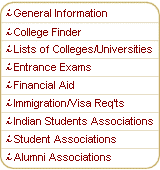Undergraduate Education
Let us begin by noting that virtually no financial assistance is available for international students for undergraduate studies. For local students, various forms of scholarships, assistantships, tuition fee relief, and loan programs are available though colleges, government and private institutions. The awarding criteria for financial aid may be needs-based, merit-based, or both. State colleges and universities (i.e. state funded) typically offer reduced tuition fees for in-state students.
Prospective undergraduate students will be well-advised to research financial aid opportunities with colleges of choice, various governmental agencies at federal, state and local levels, and private institutions.
Graduate Education
The information for local graduate students is similar to that for local undergraduate students. Various forms of scholarships, assistantships, tuition fee relief, and loan programs are available though colleges, government and private institutions. Research and teaching assistantships often accompany a partial or total tuition fee waiver as well. The awarding criteria for financial aid may be needs-based, merit-based, or both. State colleges and universities (i.e. state funded) typically offer reduced tuition fees for in-state students. You should research financial aid opportunities with colleges of choice, various governmental agencies at federal, state and local levels, and private institutions.
International students can obtain research and/or teaching assistantship for financial support. The availability of such assistantships is rather limited and, therefore, extremely competitive. Assistantships, however limited, are more readily available for engineering and computer science programs. As noted above, assistantships often accompany partial or total tuition fee waiver. International students are not eligible for loans or funding from governmental agencies.
Since many university professors have research grants, it might benefit the prospective graduate student to communicate directly with professor who could or would supervise their dissertation/thesis. Dissertation/thesis supervisors can and do offer research assistantships from their research grant.
Cost of Education
Education is very expensive in the US. Just the tuition alone can run from $5,000 to $30,000 per year, depending on the type (private or government-funded) and quality of the institution, as well as the type and quality of the program of studies. The cost of living will add another $10,000 to $20,000 per year, depending on the location.
On-campus accommodations are not necessarily cheaper than off-campus accommodations. Moreover, not all colleges offer on-campus accommodations. Your school will help you with both on-campus and off-campus accommodations.
Employment
Students can typically work on-campus or off-campus through the school year. However, international students are allowed to work on-campus only. Students can also obtain full-time employment during the summer holidays. International students are given "training visa" for 12 months of full-time employment. They can choose to use this training visa arrangement for summer employment or for employment after graduation.
One important point to note. The total sum of money secured through employment while being in school full-time can only partially offset the total costs. This is particularly true for international students.
A Special Note for International Students
Do not assume that you can obtain financial assistance after arriving in the US. Secure proper finances prior to departing for the US. Do not believe stories that you can easily obtain financial assistance once you arrive. It can happen, but most likely outcome would be that of extreme disappointment. Do not play games with your life and money. As we all know, being optimistic is good, but being unrealistic is not.





